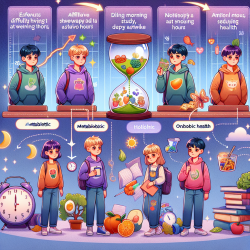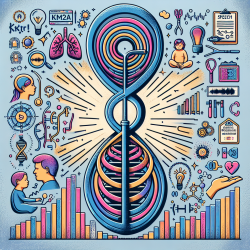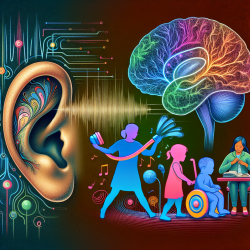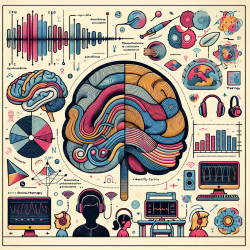Introduction
In the quest to optimize educational outcomes and health in children, understanding the role of chronotype—whether a child is a morning or evening person—has become increasingly important. A recent study, "Evening types have social jet lag and metabolic alterations in school-age children," sheds light on the implications of being an evening chronotype in young students. This blog explores how practitioners can leverage these findings to improve child health and educational outcomes.
Understanding Chronotype and Its Impact
Chronotype is a biological characteristic that influences when an individual feels most alert and active. Evening chronotypes, or "night owls," tend to be more active and alert later in the day. The study conducted by Martínez-Lozano et al. (2020) used a novel integrative measurement called TAP, which combines wrist temperature, physical activity, and body position, to objectively assess chronotype in children aged 8-12 years.
Key Findings
- Evening types displayed delayed sleep patterns, increased evening activity, and experienced more social jet lag compared to morning types.
- Evening chronotypes were associated with higher body mass index (BMI) and metabolic risks, such as elevated insulin, glucose, triglycerides, and cholesterol levels.
- Despite these risks, evening types showed better performance in artistic subjects.
Implications for Practitioners
Practitioners working with children can use these insights to tailor interventions aimed at mitigating the negative impacts of evening chronotype. Here are some strategies:
- Promote Consistent Sleep Schedules: Encourage families to maintain consistent sleep and wake times, even on weekends, to reduce social jet lag.
- Increase Morning Light Exposure: Advise parents to increase their child's exposure to natural light in the morning, which can help shift their circadian rhythm earlier.
- Encourage Physical Activity: Promote regular physical activity during the day to enhance sleep quality and reduce metabolic risks.
- Monitor Dietary Habits: Counsel families on healthy eating patterns, focusing on reducing late-night eating which is common in evening types.
Encouraging Further Research
While the study provides valuable insights, further research is needed to explore interventions that can effectively support evening chronotypes. Practitioners are encouraged to stay informed about emerging research in this area and consider participating in studies that aim to develop and test interventions tailored to different chronotypes.
To read the original research paper, please follow this link: Evening types have social jet lag and metabolic alterations in school-age children.










